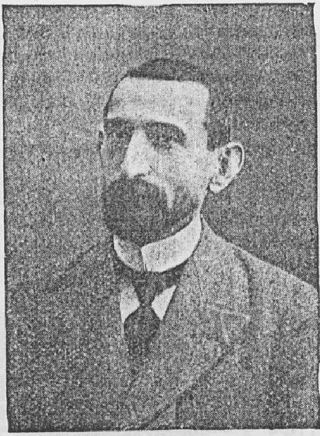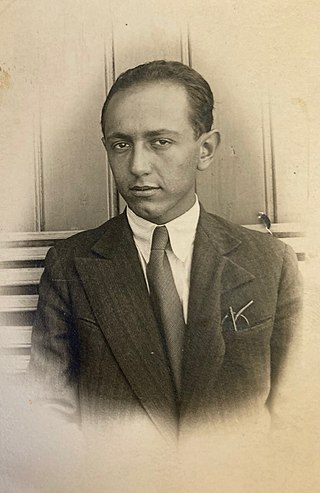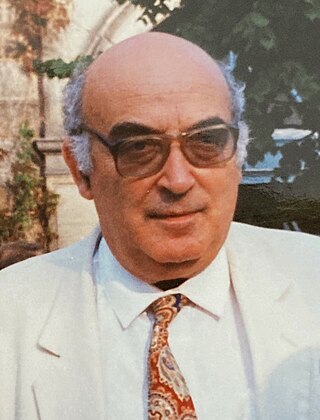Related Research Articles

Mircea the Elder was the Voivode of Wallachia from 1386 until his death in 1418. He was the son of Radu I of Wallachia and brother of Dan I of Wallachia, after whose death he inherited the throne.
Romanian literature is the entirety of literature written by Romanian authors, although the term may also be used to refer to all literature written in the Romanian language or by any authors native to Romania.
Vlad I known as Uzurpatorul, was a ruler of Wallachia in what later became Romania. He usurped the throne from Mircea I of Wallachia. His rule lasted barely three years, from October/November 1394 to January 1397, while others suggest that the accurate ruling period was from May 1395 to December 1396.

Nicolae Bretan was a Romanian opera composer, baritone, conductor, and music critic.

The Writers' Union of Romania, founded in March 1949, is a professional association of writers in Romania. It also has a subsidiary in Chișinău, Republic of Moldova. The Writers' Union of Romania was created by the communist regime by taking over the former Romanian Writers' Society, which had been established in 1908.

Victor Anestin was a Romanian journalist, science popularizer, astronomer and science fiction writer.
Events from the year 1917 in Romania.
Horia is a 1937 Romanian-language opera by Nicolae Bretan to a libretto by Ghiță Popp. The story is based on the story of Vasile Ursu Nicola "Horia", the 1784 Transylvania Romanian peasants revolt led by Horia, Cloșca and Crișan. The opera premiered on January 24, 1937 at the Romanian Opera, Cluj. It received its radio premiere on July 27, 1975.
Luceafărul is a 1921 Romanian-language opera by Nicolae Bretan based on Mihai Eminescu's long love poem of the same name with text borrowed from several other poems of Eminescu's. The piece premiered in Romanian at the Romanian Opera, Cluj, on February 2, 1921; Bretan's Hungarian translation premiered thirteen days later at the Hungarian Theatre of Cluj.
Arald is a 1942 Romanian-language 1-act opera by Nicolae Bretan. The libretto, written by the composer, is from Mihai Eminescu's poem "Strigoii", and tells a darker version of the Orpheus myth. The piece received its belated world premiere on May 12, 1982 at the Romanian Opera, Iași.
The medieval fortress of Turnu is located in the southern part of Turnu Măgurele at a distance of 3 km from the city and 1 km from the confluence of the Olt and Danube rivers in today's Romania. The fortress is documented during the reign of Mircea the Elder (1394) and was built on the Danube line for the defense of Wallachia against the Turkish peril. At the end of the reign of Mircea the Elder, under unclear circumstances, it came under Ottoman occupation to return to the possession of Wallachia only in 1829 when it was burned and demolished.
Viorel Cosma was a Romanian musician and teacher who came to wider prominence as an exceptionally prolific musicologist and a pioneering lexicographer. Through his scholarship he also achieved distinction as a teacher, researcher and music critic. Between 1989 and 2012 he produced a ten volume lexicon, running to 2,800 pages, entitled "Muzicieni din România", providing extensive information on approximately 1,500 Romanian composers and musicians, musicologists, music critics, music teachers, folklorists and other contributors to Romanian music and musicianship.
Culai Neniu was a Moldovan folklorist, dramatist, and schoolteacher. Of a Bessarabian Bulgarian background, he left the Kingdom of Romania to settle in the Soviet Union, making his way into the Moldavian Autonomous Soviet Socialist Republic (MASSR). He published several volumes of "Moldavian" folklore, generally professional in nature, but also tinged by the effects of Soviet historiography. With Ekaterina Lebedeva, Neniu put out in 1935 the anthology Cîntece poporane moldovenești, noted as the only work of its kind to coincide with the Latinization of Soviet scripts. The collection was criticized in Romania for excluding religious folklore, but was also in contradiction with the MASSR's state ideology. This resulted in Neniu's execution by the NKVD, four years after publication.
Events from the year 1921 in Romania. The year saw the formation of the Romanian Communist Party out of the Socialist Party and subsequent imprisonment of the Communist leadership.

Andrei Tudor (Romanian pronunciation:[anˈdrejˈtudor]; was a Romanian poet, translator and musicologist.

Iosif Sava-Segal, known as Iosif Sava, was a Romanian musicologist and pianist. He was particularly renowned for his decades-long live radio and television shows during which he invited famous personalities from different realms of Romanian culture to discuss their perspectives of the cultural phenomenon.

Anastase Demian was a Romanian painter, illustrator, and university professor.
References
- 1 2 3 4 5 6 Gagelmann, Hartmut. Nicolae Bretan: His Life—His Music. Translated by Beaumont Glass. Pendragon Press, Hillsdale, New York, 2000. pp. 121–123.
- 1 2 Cosma, Viorel. "Nicolae Bretan" (in Romanian). Muzicieni din România. Lexicon, vol. 1, 1989. Reproduced by Uniunea Compozitor și Muzicologilor din România. http://www.ucmr.org.ro/bio-biblio.asp?CodP=2277 Archived 2019-01-31 at the Wayback Machine Accessed July 15, 2020.
- ↑ Gagelmann, p. 290.
- 1 2 Rojnoveanu, Angela and Svetlana Badrajan. "Creatia de Opera Compozitorului Nicolae Bretan" (in Romanian). Anuar stiintific: Muzica, teatru, arte plastice, Academia de Muzică, Teatru și Arte Plastice [Academy of Music, Theater and Fine Arts], 2006. Accessed July 16, 2020.
- ↑ Eroii de la Rovine, Opera & Oratorio Premieres, Stanford University Libraries. Accessed July 15, 2020.
- ↑ Gagelmann, p. 187
- ↑ Casaglia, Gherardo (2005). "Eroii de la Rovine, 24 January 1935" . L'Almanacco di Gherardo Casaglia (in Italian).